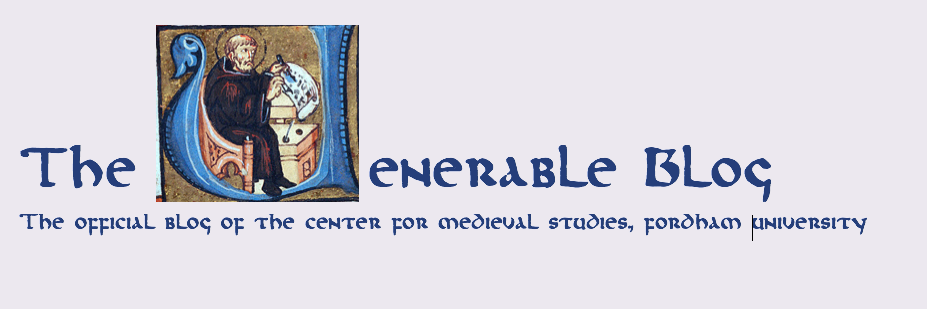This past 14 February, the Medieval Studies Department hosted their first Valentine’s Day poetry reading. In the spirit of the day, all selections discussed, in some capacity, the nature of love and its effect on the human beings fortunate (or unfortunate) enough to find themselves in its throes. From the pure love of God to the often controversial love felt between human beings, the poems and songs performed provided a wide range of perspectives of a state of being infamous for its eluding a clear definition in any known language.
It is perhaps this very elusiveness that makes the performance of Mohammad Alsidi so apt as the first given of the evening. A masterful player of the Oud, a stringed instrument originating from Ur, Alsidi performed old Aleppan music often played during the day in Sufi circles while conversations and discussion of the scripture and current events were echoing through the courtyards. While the melodies Alsidi played could be accompanied by lyric or chant, he played the pieces as they were taught to him: without vocal accompaniment. Each pluck of a string composed a wordless prayer in praise to God, proclaiming love for Him. Having roots in the region around Aleppo that stretch back nearly two millennia, these melodies, in a myriad of different forms, can be heard wherever Aleppans have strode, from India to Venezuela. Alsidi, himself a native of the region around Aleppo, played these beautiful pieces with a bittersweet tone. These melodies, like so much of Aleppo and, indeed, much of Syria, are being lost in the civil war. These songs, and the hands that can play them and the voices that can sing them, are dying. Alsidi said that he plays in order to have these pieces still heard in the world, so that we might not deafen ourselves to what is being lost while it is still here to be recorded, preserved, and enjoyed.
The next poem was Guido Cavalcanti’s “Voi che per gli occhi mi passaste il core,” delivered by Dr. Susana Barsella. A friend of Dante, Guido presented love as beautiful and uplifting, but ultimately ending in a “language of sighs.” Dr. Emanuel Fiano recited St. Ephrem’s “Hymn III: On Paradise.” Dating to the fourth century, this Syriac piece discussed the choice given to Adam and Eve over whether or not to eat of the forbidden fruit. Needless to say, their story does not end on a happy note: a reasonably consistent theme of this Valentine’s Day celebration. Next was Father Martin Chase’s recitation of lausavisur from the Old Norse Kormáks Saga. Kormák’s Saga, a prose tale with occasional segments of Skaldic song, also presents us with a narrative filled with less Cupid floating through a tranquil grove and more facing the difficulties that come with loving another over a prolonged period of time, albeit under less then mundane circumstances. However, the segment Father Chase read was one toward the beginning of the tale, when the lovers meet for the first time: a happy affair in which Kormákr fell in love at the first sight of Steingerðr’s ankles and feet.
The final three poetic readings were given by Drs. Jocelyn Wogan-Brown, Susanne Hafner, and Andrew Albin. Saying that God might deserve a Valentine’s Day gift too, Dr. Wogan-Brown presented the Old French “Rossignos” of John of Howden. Dating to the 1270s, Dr. Wogan-Brown related that this piece was written in such a way that the audience was meant to participate in its recitation, and the poetic sophistication of the piece itself shows just how intricate and elegant the Old French of England is. Dr. Hafner read “Unter der linden,” by Walther von der Vogelveide. This poem was originally set to music, though the music has been lost. Of the “dawn song” genre, “Unter der linden” presents a woman, rather than a man, reflecting upon a night of shameless sensual indulgence with her lover after he had to flee the next morning. Utilizing a number of overt euphemisms, the poem intentionally walks the line between descent and indecent evocation of a night spent in ecstasy. On that note, Dr. Albin finished the evening with a spirited reading of Chaucer’s “The Parliament of Fowls,” carrying on the theme of love being suspended between fulfillment and denial. This parliament, consisting of numerous and diverse types of birds, eagerly awaiting their dismissal from the assembly so they could fly off with their lovers, undoubtedly reminded all present of the agony of having to fulfill an obligation while one’s true desire lay just within reach. Love may be fulfilling, but no one ever said it would be easy to endure.
The Centre would like to graciously thank all who participated in this inaugural Valentine’s Day poetry reading and those who attended and experienced examples of nearly every kind of human reaction to this eternally problematic notion of love. Here’s hoping we, as humans, never actually manage to figure it out.
English Department
